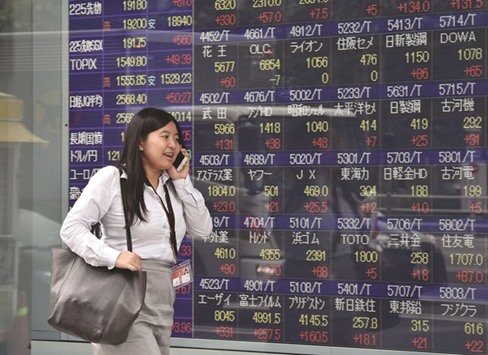Asian markets tapered yesterday after an early rally as nerves returned to trading floors, with a pick-up in the yen skimming Japan’s Nikkei.
The day started on a positive note as gains on Wall Street and in Europe—fuelled by upbeat Chinese inflation data and progress on Greece’s debt relief—provided a healthy buying catalyst after last week’s sell-offs.
The gains initially extended into Asia, with Tokyo’s Nikkei surging with exporters thanks to the weakening yen but the rally petered towards the end of the day as the Japanese unit recovered. By the close of trade Tokyo was up 0.1%. The dollar slipped to ¥108.67 from ¥109.27 late in New York, but analysts said the losses were to be expected after rallying over the past week and the dollar could hit ¥110 soon. The greenback hit a recent trough of ¥105.50 last Tuesday.
Japanese leaders, including Finance Minister Taro Aso, have tried to cap yen gains by keeping the possibility of government intervention on the table. “Talk of intervention from Japan is one catalyst pushing the yen lower,” Masato Yanagiya, head of currency and money trading at Sumitomo Mitsui Banking Corp in New York told Bloomberg News.
A pick-up in the yen—it is up more than 10% against the dollar this year so far—led Toyota on Wednesday to warn that net profit in the current fiscal year would fall by about a third.
In other markets Shanghai ended 0.2% higher and Sydney rose 0.6% but Seoul slid 0.1%.
Manila soared more than 3% as the controversial Rodrigo Duterte tried to soothe investor worries after his landslide victory in presidential elections on Monday.
Hong Kong was 1% down as mainland shares listed in the city were hit by fears China may not introduce any fresh stimulus for some time after a warning over debt levels by the government mouthpiece People’s Daily. Energy firms struggled to maintain initial gains as oil prices retreated from Tuesday’s surge. West Texas Intermediate had jumped 2.8% and Brent climbed 4.3% following data showing producer giant Nigeria’s output had hit a 22-year low because of pipeline sabotage and increasing unrest.
A report indicating US stockpiles increased last week also stunted buying sentiment.
The commodity has seen strong swings this week as traders weigh up the effects of the blazes that have torn across the vast oil sands region of Alberta, Canada, as well as disruptions elsewhere. However, analysts said they expected prices to flatline for the time being.
“The sentiment around traders in the market is that they do think the disruptions are a temporary obstacle. Longer-term, should oil companies resume production, they are expecting oil prices to hover around $40,” CMC Markets senior trader Alex Wijaya told AFP. Brent and WTI were each down 1% yesterday. In Tokyo, the Nikkei 225 up 0.1% at 16,579.01 points; Shanghai – composite down 0.2% at 2,837.04 points and Hong Kong - Hang Seng down 1.0% at 20,038.90 points at the close yesterday.

